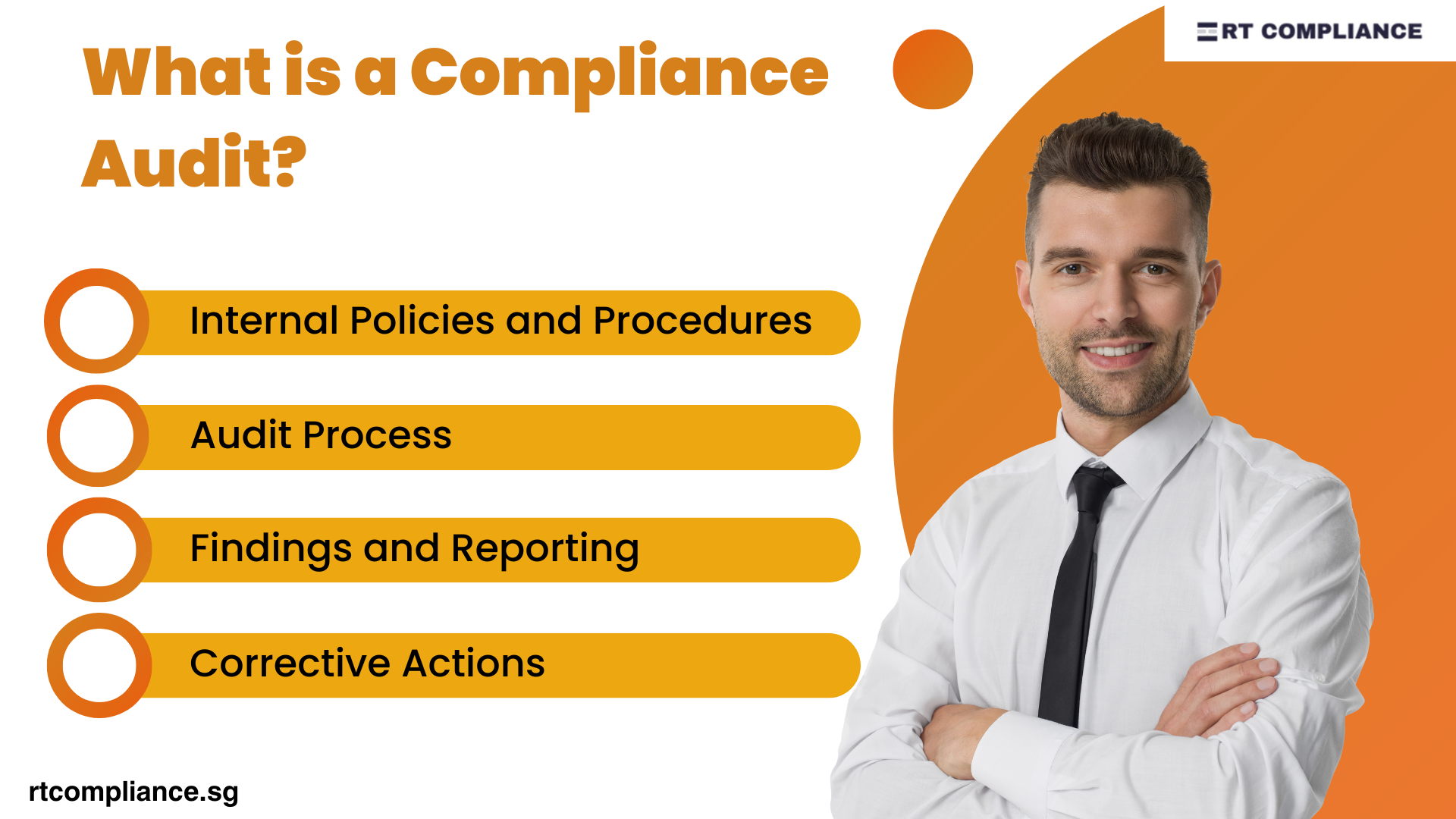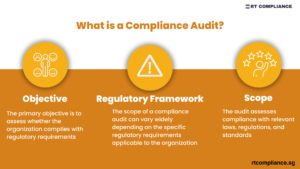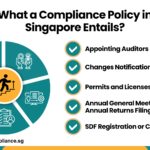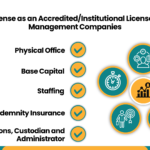What is a Compliance Audit?
Singapore is among the best places to start a business globally. Why is that? It has a supportive government that encourages locals and foreigners to invest in companies in the country. A compliance audit is an assessment of a business to check applicable laws, rules under the many orders, and all the instructions by Singapore’s authority are followed.
Its crucial role is to assure the government that all the set rules and regulations of various agreements. For instance, if a company needs to report the income of staff members. The government might request an audit to check all the employees and the wages to ensure that the taxes are correct. There can be several audits in a company by various entities depending on the subject in question.
Why is a Compliance Audit necessary?
Compliance audits are necessary for various reasons. Some businesses in Singapore may have frequent audits if it has a record of breaking laws. A compliance audit may occur once in a while to ensure that the business moves in the right direction. For instance, a textile company in Singapore may occasionally undergo auditing to ensure that it poses no danger to the environment since it is famous as an environmentally harmful firm.
Compliance audits don’t only check on an environment but are used to monitor internal affairs to determine if things can be better. As a result, it is a crucial tool that companies can use to improve customer services, increase revenue and improve the operations in a company.
Compliance auditing in Singapore
Singapore Companies Act is in charge of companies’ conduct. It requires them to comply with an annual filling of the IRAS (Inland Revenue of Singapore) and the ACRA (Accounting and Corporate Regulatory Agency. Locals and foreigners must ensure that their services are registered so that they match the relevant rules.
FYE (Financial Year-end)
The Singapore government requires that all the companies determine the FYE, often determined on the last day of a financial year. Most of the firms choose to perform to determine the FYE on December 31, while others prefer the last day of any quarter. Singapore Regulatory framework uses the FYE to determine if a company is eligible for any tax incentives. The current laws state that any company can get a 75% tax relief on the first S$100,000, viable for the first three years after founding it. Also, the next S$100,000 receives 50% tax relief.
Who is audited in Singapore?
Every private company must audit its financial reports by a public accountant annually. After a company registers under Singapore law, it needs to appoint a qualified auditor by the end of three months unless the exemptions, including annual turnover, are below S$5 million, and shareholders are below twenty. Also, the shareholders are people and not corporate investments.
Singapore is strict with the regulations to ensure maximum transparency; hence if a company is non-compliance, it stands the chance of summons, fines, and arrest warrant.
Conclusion
A compliance audit is essential and ensures transparency in the way businesses operate in Singapore. The current regulatory framework sets up the necessary compliance audit guidelines to ensure companies run smoothly.








Wow! Your blog post blew me away! Your ability to dissect complex topics and present them in a relatable, no-nonsense way is simply genius. Allow me to share with you and your audience about my first-hand experience of this ultimate Giant Killer! =>> (https://bit.ly/ai-biz-builder). With only One Keyword, One Description and One Click, this game-changing AI-powered wizardry Business Builder and Marketing Assistant devastates any competitors to achieving the Superior Lead Conversion by way of executing effortlessly all-in-one tasks similar to the likes of Wix, Hubspot, Chatgpt to Jasper, Canva, Invideo to Adode Photoshop, Midjourney, Speechelo to Convertkit, Pushit and many more. No other AI tools can match its might. Unleash the unsurpassed power of this Giant Killer and realize your business’s limitless potential. And here’s the cherry on top! During this exclusive launch, you can access all these incredible benefits for a limited one-time fee. Plus, a generous list of bonuses to fuel your business growth and add immense value to your establishment. I am so confident that you’ll fall head over heels for this product as it comes with a 30-Day Money-Back Guarantee. It’s a risk-free opportunity you simply can’t miss! Trust me, I’m not just blowing smoke. I’ve personally experienced the sheer awesomeness of this product, and I’m not alone. Over 15,000 users have already joined the revolution, and the numbers keep growing. Don’t wait, click here =>> (https://bit.ly/ai-biz-builder) to conquer the market today! For Indepth Video Guide and Reviews, Visit =>> https://bit.ly/biz-builder-bot
Your blog article is informative and engaging, offering valuable information in a concise and concise manner. The site’s appealing layout and easy-to-use interface improve the overall reading experience. Continue the great work! Just back from an unforgettable Italian holiday, I embarked on an extraordinary exploration that unveiled the captivating secret marvels of the country -> https://cutt.ly/KwuanRq2. Surprisingly, it defied my financial limitations, courtesy of the gracious support provided by -> https://cutt.ly/RwuacsAh and covered by -> https://cutt.ly/mwuacSHx. Their efforts nothing short of enchanting, turning my aspiration into an enchanting reality. 😍✨ It was truly an exhilarating journey that touched my heart, leaving me overwhelmed with gratitude. 🙏💖
The notion of compliance audits is succinctly and clearly explained in this blog post. Bookkeeping Services Singapore It’s an excellent resource for comprehending the significance of compliance in corporations.
For More Info:- https://www.leeandhew.com.sg/accounting-services-singapore/
MyCellSpy is a powerful app for remote real – Time monitoring of Android phones.
I believe this site holds very superb pent written content posts.
pin up 360 https://azerbaijancuisine.com/# pin up yukle
pin up yukle
pin up az?rbaycan: pin-up casino giris – pin up azerbaycan
https://northern-doctors.org/# purple pharmacy mexico price list
best online pharmacies in mexico: mexican pharmacy – mexico pharmacies prescription drugs
mexican rx online [url=http://northern-doctors.org/#]northern doctors pharmacy[/url] buying prescription drugs in mexico online
mexico drug stores pharmacies: northern doctors – buying prescription drugs in mexico
https://northern-doctors.org/# mexican mail order pharmacies
buying prescription drugs in mexico online: mexican pharmacy online – buying prescription drugs in mexico online
https://northern-doctors.org/# п»їbest mexican online pharmacies
mexican online pharmacies prescription drugs [url=http://northern-doctors.org/#]mexican northern doctors[/url] reputable mexican pharmacies online
pharmacies in mexico that ship to usa: northern doctors pharmacy – purple pharmacy mexico price list
http://northern-doctors.org/# pharmacies in mexico that ship to usa
mexico pharmacy: Mexico pharmacy that ship to usa – mexico drug stores pharmacies
http://northern-doctors.org/# mexican mail order pharmacies
reputable mexican pharmacies online [url=https://northern-doctors.org/#]northern doctors[/url] mexico drug stores pharmacies
buying prescription drugs in mexico: mexican pharmacy – mexican drugstore online
https://northern-doctors.org/# buying prescription drugs in mexico online
mexico pharmacies prescription drugs [url=https://northern-doctors.org/#]northern doctors[/url] best online pharmacies in mexico
mexican drugstore online: mexican pharmacy northern doctors – reputable mexican pharmacies online
https://northern-doctors.org/# mexico pharmacy
best online pharmacies in mexico [url=http://northern-doctors.org/#]mexican pharmacy[/url] pharmacies in mexico that ship to usa
buying prescription drugs in mexico: mexican pharmacy northern doctors – reputable mexican pharmacies online
https://northern-doctors.org/# mexico pharmacies prescription drugs
mexico pharmacy: mexican northern doctors – mexican rx online
best online pharmacies in mexico: mexican pharmacy – mexico pharmacies prescription drugs
https://northern-doctors.org/# mexican border pharmacies shipping to usa
mexico drug stores pharmacies [url=https://northern-doctors.org/#]mexican pharmacy[/url] mexico drug stores pharmacies
https://northern-doctors.org/# mexican border pharmacies shipping to usa
mexican pharmaceuticals online: mexican pharmacy online – mexican pharmaceuticals online
[…] today’s complex regulatory landscape, compliance auditing has become a critical function for organizations across various industries. Compliance auditing […]
mexican mail order pharmacies: northern doctors – mexican mail order pharmacies
https://northern-doctors.org/# mexico pharmacies prescription drugs
buying from online mexican pharmacy: mexican pharmacy northern doctors – mexican pharmaceuticals online
https://northern-doctors.org/# mexico pharmacy
mexican drugstore online: Mexico pharmacy that ship to usa – mexican pharmaceuticals online
mexican mail order pharmacies: mexican northern doctors – mexican border pharmacies shipping to usa
https://northern-doctors.org/# buying prescription drugs in mexico online
mexican mail order pharmacies [url=https://northern-doctors.org/#]mexican mail order pharmacies[/url] mexican border pharmacies shipping to usa
buying prescription drugs in mexico online: mexican pharmacy – buying from online mexican pharmacy
п»їbest mexican online pharmacies [url=https://northern-doctors.org/#]northern doctors pharmacy[/url] mexican pharmaceuticals online
mexican pharmaceuticals online: mexican pharmacy online – mexico drug stores pharmacies
https://northern-doctors.org/# mexico drug stores pharmacies
reputable mexican pharmacies online: mexican pharmacy – purple pharmacy mexico price list
https://northern-doctors.org/# mexican mail order pharmacies
pharmacies in mexico that ship to usa [url=http://northern-doctors.org/#]mexican pharmacy northern doctors[/url] reputable mexican pharmacies online
buying from online mexican pharmacy: northern doctors pharmacy – mexican drugstore online
http://northern-doctors.org/# mexican rx online
п»їbest mexican online pharmacies [url=https://northern-doctors.org/#]Mexico pharmacy that ship to usa[/url] mexican drugstore online
п»їbest mexican online pharmacies: medicine in mexico pharmacies – mexico pharmacies prescription drugs
mexican pharmacy: mexican border pharmacies shipping to usa – mexico drug stores pharmacies
mexico pharmacies prescription drugs: Mexico pharmacy that ship to usa – mexico drug stores pharmacies
http://northern-doctors.org/# mexican rx online
mexico pharmacy: northern doctors – mexico drug stores pharmacies
https://northern-doctors.org/# mexican pharmacy
buying from online mexican pharmacy [url=https://northern-doctors.org/#]mexican pharmacy northern doctors[/url] mexican pharmaceuticals online
https://northern-doctors.org/# mexican rx online
mexico drug stores pharmacies: mexican pharmacy – pharmacies in mexico that ship to usa
mexican pharmaceuticals online: mexican pharmacy – mexican rx online
https://northern-doctors.org/# mexico pharmacy
buying from online mexican pharmacy: mexican pharmacy online – reputable mexican pharmacies online
п»їbest mexican online pharmacies: mexican pharmacy – medication from mexico pharmacy
medication from mexico pharmacy: northern doctors pharmacy – mexican mail order pharmacies
https://northern-doctors.org/# mexico pharmacies prescription drugs
mexican rx online: northern doctors – medication from mexico pharmacy
buying from online mexican pharmacy: mexican pharmacy – mexican online pharmacies prescription drugs
best online pharmacies in mexico [url=https://northern-doctors.org/#]mexican northern doctors[/url] mexico pharmacies prescription drugs
https://northern-doctors.org/# mexican online pharmacies prescription drugs
mexico pharmacies prescription drugs: Mexico pharmacy that ship to usa – reputable mexican pharmacies online
https://northern-doctors.org/# mexico pharmacies prescription drugs
pharmacies in mexico that ship to usa [url=https://northern-doctors.org/#]mexican pharmacy northern doctors[/url] mexico pharmacy
mexican border pharmacies shipping to usa: mexican pharmacy – best online pharmacies in mexico
п»їbest mexican online pharmacies: mexican pharmacy – buying prescription drugs in mexico
http://northern-doctors.org/# mexico pharmacies prescription drugs
reputable mexican pharmacies online: mexican pharmacy online – buying prescription drugs in mexico
http://northern-doctors.org/# buying from online mexican pharmacy
medication from mexico pharmacy [url=https://northern-doctors.org/#]mexican northern doctors[/url] medicine in mexico pharmacies
buying prescription drugs in mexico: mexican northern doctors – mexican pharmacy
mexican rx online: reputable mexican pharmacies online – medicine in mexico pharmacies
best online pharmacies in mexico: mexican pharmacy – mexican rx online
http://northern-doctors.org/# buying from online mexican pharmacy
https://cmqpharma.online/# mexican border pharmacies shipping to usa
mexico drug stores pharmacies
best online pharmacies in mexico [url=https://cmqpharma.online/#]cmqpharma.com[/url] purple pharmacy mexico price list
mexico pharmacies prescription drugs
https://cmqpharma.com/# purple pharmacy mexico price list
mexican rx online
mexican pharmacy [url=http://cmqpharma.com/#]mexico pharmacy[/url] medicine in mexico pharmacies
mexico drug stores pharmacies [url=http://cmqpharma.com/#]cmqpharma.com[/url] mexican pharmacy
purple pharmacy mexico price list [url=https://cmqpharma.online/#]pharmacies in mexico that ship to usa[/url] mexico pharmacy
mexican border pharmacies shipping to usa [url=https://cmqpharma.online/#]mexican pharmacy[/url] mexican pharmacy
mexican pharmacy [url=https://cmqpharma.online/#]mexican online pharmacy[/url] mexican online pharmacies prescription drugs
http://cmqpharma.com/# mexican online pharmacies prescription drugs
reputable mexican pharmacies online
medicine in mexico pharmacies
https://cmqpharma.online/# п»їbest mexican online pharmacies
mexican rx online
buying prescription drugs in mexico: cmq mexican pharmacy online – buying from online mexican pharmacy
… [Trackback]
[…] There you can find 88256 more Information to that Topic: rtcompliance.sg/what-is-a-compliance-audit/ […]
https://foruspharma.com/# medicine in mexico pharmacies
mexican online pharmacies prescription drugs: mexican mail order pharmacies – mexico drug stores pharmacies
indian pharmacies safe [url=http://indiapharmast.com/#]buy prescription drugs from india[/url] india pharmacy
india pharmacy: Online medicine order – online shopping pharmacy india
indian pharmacy: indianpharmacy com – reputable indian pharmacies
п»їbest mexican online pharmacies: п»їbest mexican online pharmacies – buying prescription drugs in mexico
https://canadapharmast.com/# canadian world pharmacy
canada pharmacy 24h [url=https://canadapharmast.online/#]canadian pharmacy 24 com[/url] legit canadian online pharmacy
india pharmacy [url=https://indiapharmast.com/#]online shopping pharmacy india[/url] Online medicine home delivery
mexican pharmaceuticals online: mexican border pharmacies shipping to usa – mexico pharmacies prescription drugs
http://indiapharmast.com/# Online medicine order
ed meds online canada: canadian pharmacy prices – reliable canadian online pharmacy
cheapest online pharmacy india: indian pharmacy online – indian pharmacy
cheapest online pharmacy india [url=https://indiapharmast.com/#]top online pharmacy india[/url] buy prescription drugs from india
https://indiapharmast.com/# india online pharmacy
india online pharmacy: indianpharmacy com – best online pharmacy india
canadian pharmacies compare: the canadian pharmacy – real canadian pharmacy
mexican online pharmacies prescription drugs: mexican pharmacy – mexican mail order pharmacies
my canadian pharmacy review [url=https://canadapharmast.com/#]canada pharmacy 24h[/url] canadian mail order pharmacy
medicine in mexico pharmacies: medication from mexico pharmacy – buying from online mexican pharmacy
http://canadapharmast.com/# the canadian pharmacy
best canadian online pharmacy [url=https://canadapharmast.online/#]canadian pharmacy 24h com safe[/url] adderall canadian pharmacy
п»їlegitimate online pharmacies india: top online pharmacy india – indian pharmacy online
online pharmacy india: indian pharmacy online – reputable indian pharmacies
antibiotics cipro: ciprofloxacin – п»їcipro generic
https://clomiddelivery.pro/# how to get generic clomid pills
can i purchase generic clomid tablets: where can i get cheap clomid without dr prescription – where to buy generic clomid pill
http://doxycyclinedelivery.pro/# doxycycline pills for sale
п»їcipro generic [url=https://ciprodelivery.pro/#]buy ciprofloxacin[/url] ciprofloxacin order online
ciprofloxacin 500 mg tablet price: cipro for sale – purchase cipro
http://doxycyclinedelivery.pro/# vibramycin doxycycline
https://ciprodelivery.pro/# buy ciprofloxacin
can i buy generic clomid online [url=https://clomiddelivery.pro/#]how can i get clomid without rx[/url] where buy generic clomid online
https://clomiddelivery.pro/# where buy clomid online
can i buy amoxicillin over the counter in australia: buying amoxicillin online – amoxicillin 500mg capsules
https://ciprodelivery.pro/# buy generic ciprofloxacin
can i get generic clomid prices [url=https://clomiddelivery.pro/#]where can i get clomid without rx[/url] generic clomid without rx
buy cipro: where can i buy cipro online – buy cipro
amoxicillin generic: amoxicillin cephalexin – amoxicillin 500 mg tablet price
http://doxycyclinedelivery.pro/# can you buy doxycycline over the counter in south africa
http://clomiddelivery.pro/# where to buy cheap clomid online
buy paxlovid online [url=https://paxloviddelivery.pro/#]paxlovid price[/url] п»їpaxlovid
http://paxloviddelivery.pro/# buy paxlovid online
paxlovid for sale: paxlovid cost without insurance – paxlovid india
http://amoxildelivery.pro/# buy amoxicillin canada
can we buy amoxcillin 500mg on ebay without prescription [url=http://amoxildelivery.pro/#]amoxicillin 500 mg for sale[/url] cost of amoxicillin 30 capsules
cheap doxycycline 100mg: how to get doxycycline online – doxycycline 50 medicine
https://clomiddelivery.pro/# order cheap clomid now
how can i get doxycycline over the counter: where can i buy doxycycline – doxycycline 300 mg tablet
https://doxycyclinedelivery.pro/# where can i purchase doxycycline
amoxicillin 500mg cost [url=https://amoxildelivery.pro/#]amoxicillin tablet 500mg[/url] amoxicillin 800 mg price
http://doxycyclinedelivery.pro/# doxycycline 1000 mg best buy
cost of amoxicillin prescription: amoxicillin buy no prescription – amoxicillin discount coupon
http://paxloviddelivery.pro/# buy paxlovid online
purchase cipro [url=https://ciprodelivery.pro/#]antibiotics cipro[/url] ciprofloxacin order online
order amoxicillin 500mg: amoxicillin no prescription – amoxicillin brand name
http://clomiddelivery.pro/# cost of cheap clomid
https://paxloviddelivery.pro/# paxlovid price
buy cipro [url=https://ciprodelivery.pro/#]cipro[/url] where can i buy cipro online
how can i get cheap clomid without dr prescription: get generic clomid without rx – how can i get generic clomid
п»їpaxlovid: paxlovid pharmacy – paxlovid pharmacy
https://clomiddelivery.pro/# buying cheap clomid
buy clomid no prescription [url=https://clomiddelivery.pro/#]can i get generic clomid online[/url] can you buy generic clomid no prescription
amoxicillin 500mg capsule cost: buy amoxicillin online uk – can you buy amoxicillin over the counter in canada
https://clomiddelivery.pro/# can i purchase cheap clomid no prescription
https://amoxildelivery.pro/# ampicillin amoxicillin
http://amoxildelivery.pro/# amoxicillin medicine
where buy clomid pills [url=https://clomiddelivery.pro/#]can you get clomid online[/url] buy generic clomid no prescription
https://amoxildelivery.pro/# prescription for amoxicillin
doxycycline tablets over the counter: doxycycline 2985 – where to purchase doxycycline
paxlovid cost without insurance: paxlovid pharmacy – paxlovid price
https://ciprodelivery.pro/# antibiotics cipro
https://doxycyclinedelivery.pro/# doxycycline online usa
paxlovid pill [url=http://paxloviddelivery.pro/#]paxlovid pill[/url] paxlovid pill
https://ciprodelivery.pro/# ciprofloxacin mail online
how can i get cheap clomid: how to buy clomid no prescription – cost clomid no prescription
https://doxycyclinedelivery.pro/# doxycycline over the counter australia
Paxlovid buy online: paxlovid generic – paxlovid india
http://ciprodelivery.pro/# ciprofloxacin 500 mg tablet price
where can i buy amoxicillin over the counter uk [url=https://amoxildelivery.pro/#]where can i buy amoxicillin online[/url] antibiotic amoxicillin
http://doxycyclinedelivery.pro/# doxycycline prescription price
amoxicillin online no prescription: amoxicillin 500mg cost – amoxicillin 500mg without prescription
buy cipro online without prescription: ciprofloxacin 500 mg tablet price – ciprofloxacin over the counter